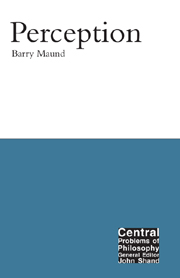Book contents
- Frontmatter
- Contents
- Preface
- 1 The philosophy of perception
- 2 A theory of natural realism
- 3 Theories of perceptual experiences
- 4 Representationalism: representations as natural signs
- 5 Natural realism: Putnam, Austin and Heidegger
- 6 Perception: the argument from illusion
- 7 The phenomenal and phenomenological senses of “looks”
- 8 Types of perceptual content
- 9 The representationalist–intentionalist thesis
- 10 Adverbialist accounts of perceptual experience
- Conclusion
- Notes
- References
- Index
3 - Theories of perceptual experiences
- Frontmatter
- Contents
- Preface
- 1 The philosophy of perception
- 2 A theory of natural realism
- 3 Theories of perceptual experiences
- 4 Representationalism: representations as natural signs
- 5 Natural realism: Putnam, Austin and Heidegger
- 6 Perception: the argument from illusion
- 7 The phenomenal and phenomenological senses of “looks”
- 8 Types of perceptual content
- 9 The representationalist–intentionalist thesis
- 10 Adverbialist accounts of perceptual experience
- Conclusion
- Notes
- References
- Index
Summary
Two crucial elements emerge from my elaboration of the natural realist account of perception. The first is that perception is a process involving the acquisition of perceptual knowledge, both practical and reflective. The second is that an adequate description of the natural realist account requires the minimalist account to be extended so as to include an account of perceptual experiences and their role in the acquisition of this knowledge.
In arguing about the role of perceptual experiences we need to be careful since, as was argued in Chapter 2, we can draw a contrast between a neutral sense of “perceptual experience”, and one that is philosophically charged. The term “perceptual experience” is often used in philosophical discussions with certain philosophical commitments built into it, for example, it is thought of as involving sensations, or sense impressions, or phenomenal elements or qualia and so on. Understood in these ways, the existence of perceptual experiences is controversial and needs to be argued for. However, it is also possible to use the term in a neutral sense. In the most neutral sense, examples of perceptual experiences are instances of seeing things, hearing things and so on. More specifically they are, for example: seeing a jacaranda tree in full bloom, hearing a flute played, touching soft velvet and so on.
- Type
- Chapter
- Information
- Perception , pp. 51 - 66Publisher: Acumen PublishingPrint publication year: 2002

